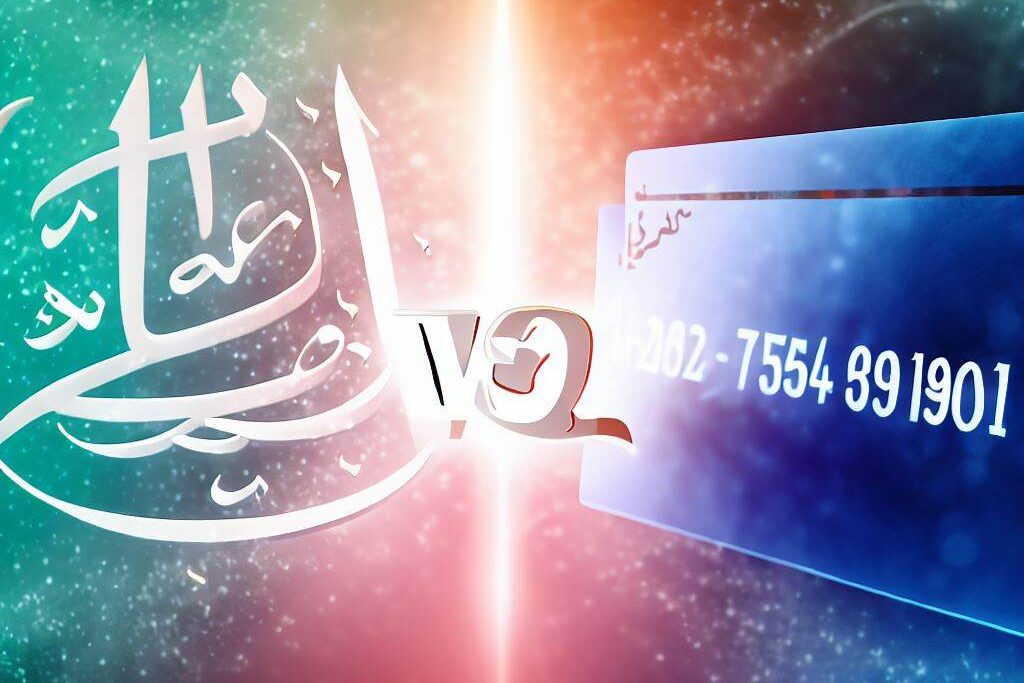
Introduction
If you’re looking for a credit card that suits your lifestyle and beliefs, you might be wondering whether to choose an Islamic or a conventional one. What are the differences between them and how do they affect your finances? In this article, we’ll give you an introduction on Islamic vs. conventional credit cards, and help you decide which one is right for you.
Key Takeaways – Islamic vs Conventional Credit Cards
| Feature | Islamic Credit Card | Conventional Credit Card |
|---|---|---|
| Interest | No interest is charged on the card balance. Instead, the card issuer and the cardholder share the profit or loss from the card usage. | Interest is charged on the card balance that is not paid off by the due date. The interest rate varies depending on the card issuer and the card type. |
| Annual Fee | No annual fee is charged for most Islamic credit cards. | Annual fee may be charged depending on the card issuer and the card type. Some cards may waive the annual fee for certain conditions. |
| Rewards | Rewards are offered for purchases made with Islamic credit cards. The rewards may include cashback, points, vouchers, or donations to charity. | Rewards are also offered for purchases made with conventional credit cards. The rewards may include cashback, points, miles, or discounts. |
| Restrictions | Islamic credit cards cannot be used for transactions that are prohibited by Islamic law, such as gambling, alcohol, or pork products. |
How do credit cards work in conventional banking?
Credit cards are a convenient way to pay for things without carrying cash or using your bank account. But how do they work in conventional banking? Basically, when you use a credit card, you are borrowing money from the card issuer, which is usually a bank or a financial institution.
The card issuer pays the merchant on your behalf and then charges you interest on the amount you borrowed. The interest rate depends on your credit score, which is a measure of how likely you are to repay your debts. The higher your credit score, the lower your interest rate. You also have to pay a minimum amount every month to avoid late fees and penalties. If you pay off your balance in full every month, you can avoid paying any interest at all.
Credit cards can be useful for building credit history, earning rewards and benefits, and managing your cash flow. However, they also come with risks and responsibilities. You have to be careful not to overspend, miss payments, or exceed your credit limit. Otherwise, you could damage your credit score, incur fees and charges, and get into debt.
Structure of credit cards in Islamic Banking
Credit cards are a convenient way to pay for goods and services, but they also come with interest charges and fees that can increase your debt. Islamic credit cards are different from conventional credit cards because they follow the principles of Shariah law, which prohibit interest (riba), gambling, alcohol, and other unlawful activities.
Islamic credit cards work on the concept of Ta’widh, which is an agreement between the bank and the customer. The bank provides funding to the customer, and the customer pays back the bank in installments. The bank does not charge interest, but it may charge a fee for late payments or non-payment. The fee is not a penalty, but a compensation for the bank’s loss of profit.
Islamic credit cards also have a filtering system that ensures that the card can only be used for halal transactions. For example, you cannot use an Islamic credit card to buy alcohol or gamble. If you do, the bank may cancel your card or donate your rewards to charity.
Islamic credit cards offer similar benefits as conventional credit cards, such as rewards, cashback, air miles, and discounts. However, they also have some advantages that conventional cards do not have, such as:
- They help you avoid debt and interest charges
- They promote ethical and responsible spending
- They support Islamic banking and finance
There are many types of Islamic credit cards available in the market, such as platinum, gold, silver, and classic. Some of them are co-branded with airlines, petrol stations, or retailers. You can choose an Islamic credit card that suits your needs and preferences.
Case Study – An Islamic Credit card of a UK Bank
Case Study – An Islamic Credit Card of a UK Bank
One of the UK banks that offers an Islamic credit card is Al Rayan Bank, which is authorised and regulated by the Financial Conduct Authority and the Prudential Regulation Authority. Al Rayan Bank launched its Islamic credit card in 2014, in partnership with Mastercard. The card is called Al Rayan Bank Credit Card and it has a limit of £5,000. The card can be used anywhere that accepts Mastercard, both in the UK and abroad.
The Al Rayan Bank Credit Card works as follows: when a cardholder makes a purchase, Al Rayan Bank pays the merchant on behalf of the cardholder and then sells the goods or services back to the cardholder at a fixed price, which is equal to the original purchase price plus a service fee. The service fee is calculated based on the cardholder’s credit rating and the repayment period, which can range from 3 to 36 months.
The cardholder can choose to pay the full amount or a minimum amount each month, as long as they pay off the balance within the agreed repayment period. If the cardholder pays late, they are required to make a charity donation of £10 per month, which goes to a charity chosen by Al Rayan Bank.
The Al Rayan Bank Credit Card is designed to provide a Shariah-compliant alternative to conventional credit cards for Muslim customers who want to avoid interest and other prohibited activities. The card also offers other benefits, such as cashback rewards, travel insurance, purchase protection and fraud protection. The card has an annual fee of £15, which is waived for the first year.
The Al Rayan Bank Credit Card is an example of how UK banks can cater to the needs and preferences of Muslim customers, who make up about 5% of the UK population. By offering an Islamic credit card, Al Rayan Bank aims to promote ethical and responsible banking practices that are in line with Islamic values.

Difference between conventional and Islamic credit cards
If you are looking for a credit card that is compatible with your faith, you might want to consider an Islamic credit card. Islamic credit cards are different from conventional credit cards in several ways, but they also offer some benefits that you may not find elsewhere. Here are some of the main differences between Islamic and conventional credit cards:
- Interest: Conventional credit cards charge interest on the balance that you don’t pay off every month. This can add up to a lot of extra money that you have to pay back. Islamic credit cards do not charge interest, because it is forbidden by Islamic law (Sharia). Instead, they use a profit and loss sharing system, where the card issuer and the cardholder share the profits or losses from the card usage. This way, you don’t have to worry about paying more than what you borrowed.
- Purchases: Conventional credit cards allow you to buy anything you want, as long as it is within your credit limit. Islamic credit cards have some restrictions on what you can buy with them. You cannot use them for things that are prohibited by Islam, such as gambling, alcohol, pork, or anything that harms others. This helps you avoid spending money on things that are not good for you or your society.
- Rewards: Conventional credit cards often offer rewards programs, where you can earn points or cash back for every purchase you make. Islamic credit cards also offer rewards, but they are based on Islamic principles. For example, some Islamic credit cards donate a percentage of your spending to charity, or give you discounts on halal products or services. This way, you can earn rewards while also doing good deeds.
- Fees: Conventional credit cards may charge various fees, such as annual fees, late payment fees, over-limit fees, or foreign transaction fees. Islamic credit cards try to avoid charging fees as much as possible, because they are considered unfair or excessive. If they do charge any fees, they are usually minimal and transparent.
As you can see, Islamic credit cards are different from conventional credit cards in many ways. They are designed to help you manage your finances in a way that is ethical and responsible. If you are interested in getting an Islamic credit card, you can check out some of the options available from various Islamic banks or financial institutions.
What are the benefits of an Islamic credit card?
Some of the benefits of using an Islamic credit card are:
- It helps you avoid paying interest, which is prohibited in Islam and can lead to debt and financial problems.
- It allows you to manage your finances in a responsible and ethical way, without compromising your faith or values.
- It gives you access to convenient and secure payment methods, especially for online shopping or traveling abroad.
- It enables you to enjoy various perks and incentives, depending on the type of card you choose and the bank you deal with.
Islamic credit cards are not widely available in the UK, but there are some banks and financial institutions that offer them or plan to offer them in the future. If you are interested in getting an Islamic credit card, you should do some research and compare different options to find the one that suits your needs and preferences. You should also make sure that the card you choose is certified by a reputable Shariah board or committee, and that it follows the guidelines of Islamic banking and finance.
What should be considered when applying for an Islamic credit card?
Islamic credit cards are based on the principle of Shariah, which prohibits charging or paying interest (riba) and engaging in unethical or speculative transactions (gharar and maysir). Instead, Islamic credit cards use alternative mechanisms such as profit-sharing, leasing, or deferred payment to provide financing to customers.
- Islamic credit cards are regulated by a Shariah board, which ensures that the products and services offered by the card issuer are in compliance with the Islamic law. The Shariah board also audits the transactions and profits of the card issuer and distributes a portion of the profits to charitable causes (zakat).
- Islamic credit cards may have different features and benefits than conventional credit cards, such as lower fees, higher rewards, or special discounts. However, they may also have some limitations, such as restricted merchant categories, lower credit limits, or shorter repayment periods. You should compare different Islamic credit cards and choose the one that suits your needs and preferences best.
- Islamic credit cards may have different eligibility criteria than conventional credit cards, such as income level, employment status, or credit history. You should check the requirements of the card issuer and make sure you meet them before applying for an Islamic credit card. You should also provide accurate and honest information in your application form and avoid any false or misleading statements.
How do you apply for an Islamic credit card?
To apply for an Islamic credit card, you need to find a bank or a financial institution that offers Shariah-compliant products. In the UK, there are currently no banks that offer Islamic credit cards, but there have been some in the past. You may need to look for other options such as Islamic debit cards or prepaid cards that have similar features. You also need to meet the eligibility criteria of the bank, such as having a good credit score, a stable income, and a valid ID.
What are the eligibility requirements for Islamic credit cards?
To apply for an Islamic credit card, you need to meet some eligibility requirements. These may vary depending on the card issuer and the type of card you choose, but generally they include:
- Being a Muslim or having an interest in Islamic banking
- Being at least 18 years old
- Having a regular source of income
- Having a good credit history
- Having a bank account with the card issuer or another Islamic bank
If you meet these requirements, you can fill out an application form and submit it along with the required documents, such as your identity card, proof of income, and bank statements. The card issuer will then review your application and conduct a background check to ensure that you are a suitable candidate for an Islamic credit card.
If your application is approved, you will receive your card and a contract that outlines the terms and conditions of using the card. You should read this contract carefully and make sure that you understand your rights and obligations as a cardholder.
Can non-Muslims apply for an Islamic credit card?
anyone can apply for an Islamic credit card, regardless of their faith or background. You do not need to be a Muslim or practice Islam to use a Shariah-compliant card. In fact, some non-Muslims may find Islamic credit cards appealing because they offer ethical and transparent banking options.
However, you should be aware that Islamic credit cards may have some limitations and conditions that differ from conventional cards. For example, you may not be able to use them for certain purchases or services that are not compatible with Islamic values.
If you are interested in applying for an Islamic credit card, you should do some research and compare different products and providers. You should also read the terms and conditions carefully and understand your rights and obligations as a customer. Islamic credit cards are not widely available in the UK at the moment, but they may become more accessible in the future as the demand for Shariah banking grows.
Conclusion
To conclude, there are some significant differences between Islamic credit cards and conventional credit cards, such as:
- Interest: Islamic credit cards do not charge interest on the outstanding balance, while conventional credit cards do. Instead, Islamic credit cards use a profit and loss sharing system, where the card issuer and cardholder share the benefits or risks of the card usage .
- Collateral: Islamic credit cards may require collateral in some cases, such as a main deposit or an undated check, while conventional credit cards do not.
- Contract type: Islamic credit cards are based on lease contracts, where the card issuer pays the seller and then charges the cardholder for the amount due. Conventional credit cards are based on loan contracts, where the card issuer lends money to the cardholder and then charges interest on it .
- Transaction restrictions: Islamic credit cards may not be used for prohibited activities according to Islamic law, such as gambling or buying alcohol. Conventional credit cards do not have these limitations.
- Profit margin on deposits: Islamic credit cards may offer a profit margin on the deposits made by the cardholders, while conventional credit cards do not.
- Late payment fees: Islamic credit cards may charge late payment fees, but they are donated to charity and not kept by the card issuer. Conventional credit cards may charge late payment fees and keep them as income.
These differences reflect the different principles and objectives of Islamic and conventional finance. Islamic finance aims to promote social justice, economic development and ethical values, while conventional finance focuses on maximizing profits and minimizing risks.
FAQ
Q: Where can I get an Islamic credit card?
A: Islamic credit cards are issued by Islamic banks or financial institutions that follow sharia principles. Some examples are Al Rajhi Bank, Bank Islam, and Maybank Islamic. Some conventional banks also offer sharia-compliant credit cards, such as Citibank and HSBC. You can compare different Islamic credit cards online and apply for the one that suits your needs and preferences.




